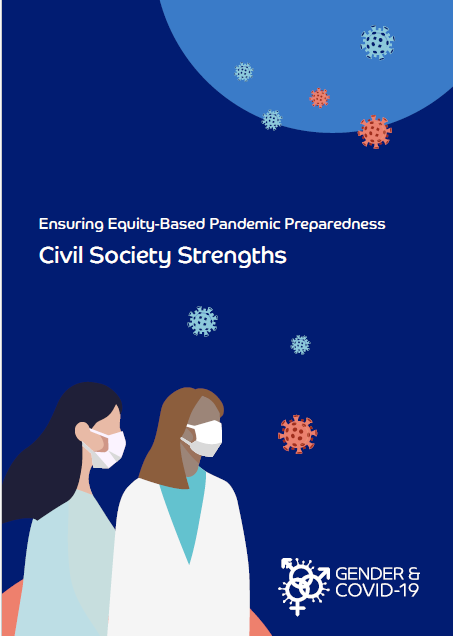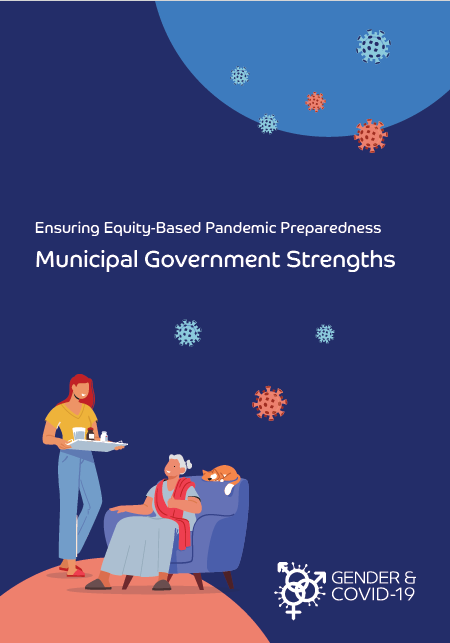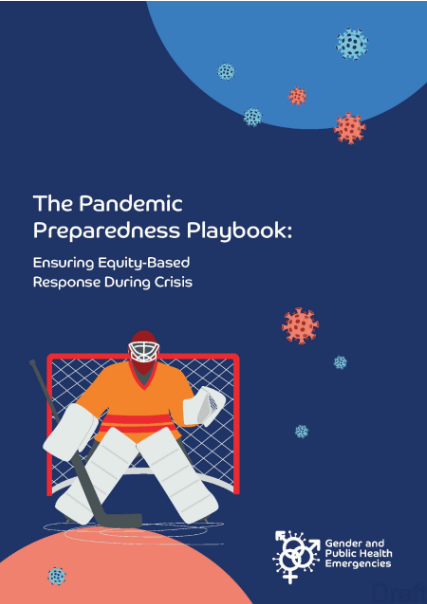Resources
![]()
This is a collection of resources from the Gender and Public Health Emergencies project and the Gender Working Group. You can search by year, country and type of resource. We hope you will enjoy reading this growing body of knowledge from around the world.
We have a wider collection of Gender and COVID-19 resources in this google document which is curated by Rosemary Morgan.
Abstract Purpose To improve understanding of the barriers and enablers to implementing gender and intersectional analysis during the COVID-19 pandemic in Canada. Methods We conducted a policy document analysis (n = 70) of equity-focused policies of the Canadian government published between March 2020 and August 2023. This analysis was complemented with 16 semi-structured key informant interviews with […]
Equity-based pandemic preparedness recognizes that responses to health crisis can worsen existing social, economic, and health inequities, as well as create new ones. However, this doesn’t have to be the case. A team-based approach – including all sectors of government and civil society – can provide a robust response to pandemics and protect against inequitable […]
Equity-based pandemic preparedness recognizes that responses to health crisis can worsen existing social, economic, and health inequities, as well as create new ones. However, this doesn’t have to be the case. A team-based approach – including all sectors of government and civil society – can provide a robust response to pandemics and protect against inequitable […]
Pandemics disproportionately affect women due to their dominant roles in healthcare, caregiving, and industries vulnerable to public health policies. Women face higher infection risks, greater unpaid care burdens, and job losses during crises. Violence against women and disrupted access to healthcare, including sexual and reproductive services, also increase. Despite clear evidence of these effects, global […]
The Advancing Equity-Based Pandemic Preparedness Through Intersectional Analysis project was funded by the Canadian Institutes of Health Research Catalyst Grant: CPHO’s Report 2021 – Future of Public Health. The project aims to draw on learnings from the COVID-19 response to better understand public policy opportunities and challenges related to mitigating the unequal effects of health […]
April 29, 2024, was marked by one of Brazil’s worst extreme weather events. The majority of cities from Rio Grande do Sul, the most populated state in southern Brazil, has been underwater, with the Guaíba river reaching its highest recorded level of 5.3 m. On May 1, 2024, the Government declared a state of public calamity, with 114 municipalities […]
Before COVID-19, Kenya was among the countries in sub-Saharan Africa already dealing with high Gender-Based Violence (GBV) issues. Kenya had experienced prior convoluted emergencies and endemics, which had an inordinate impingement on women and girls that heightened their vulnerability to GBV. The Kenyan Ministry of Public Service and Gender reported that in 2020, there was […]
‘Stories of Resilience – Local Lives and Health Systems’ is a podcast series from ReBUILD for Resilience. Each episode examines a different resilience-related topic, with a particular focus on fragile and shock-prone settings. In this second episode – ‘Gender, health systems resilience and equity‘ – we explore the intersection of gender and health systems in […]
A growing literature has documented how the secondary effects of the COVID-19 pandemic have compounded socioeconomic vulnerabilities already present in society, particularly across social categories such as gender, race, class, and socioeconomic status. Such effects demonstrate how pandemic response policies act as structural determinants of health to influence not only direct health outcomes but also […]
Historical marginalisation and ongoing trust deficits in health and government systems shape present-day vaccine perceptions among marginalised communities. This paper sought to understand the role of trust in decision-making about COVID-19 vaccine uptake in the transgender and disability communities in India. Using a participatory approach researchers interviewed 24 community representatives, identifying themselves as transgender individuals […]
COVID-19 has highlighted, unequivocally, the need for strengthened health and care workforce policies and systems globally. As Member States negotiate a new WHO Pandemic Agreement to ensure improved collaboration, coordination, and collective action for future pandemics, it is paramount to learn from the challenges experienced and vocalised by the health and care workforce during the […]
The COVID-19 pandemic was marked by vaccines, therapeutics, and diagnostics apartheid, as well as the decimation of health systems. In this report, from Matahari Global Solutions, the gender-related barriers to accessing COVID-19 vaccines are explored. Through a process of interviewing 25 individuals from global health agencies, UN agencies, civil society organisations (including feminist and LGBTQIA+ […]
This report documents the experiences of women hotel workers—a group of women who have been deeply affected by the COVID-19 pandemic but rarely represented in media, research or policy debates. It draws on focus groups and interviews with 27 women hotel workers in B.C. Canada, the majority of whom are immigrant and racialized women. Their […]
The COVID-19 pandemic disproportionately affected those who face historical and ongoing marginalisation. In centering pandemic experience of recent immigrant women in the accommodation and food services sector in Canada, we examine how their precarious work translated to experiences of work precarity and wellbeing. This paper illuminates how pre-existing and ongoing marginalisation are reproduced during a […]
The COVID-19 pandemic has generated a global conversation about gender equality and pandemic leadership. Organisations such as UN Women, Women in Global Health and Global Health 50/50 have advocated for greater representation of women in leadership, noting that despite women making up over 70% of healthcare workers, they made up only 24% of COVID-19 task […]
Community engagement can provide insights into how priority populations are experiencing the crisis and can help to identify community needs. In turn, this can guide interventions to reduce health and social inequities exacerbated during crises. The Community-Engaged Research During Health Crises handbook is a resource for researchers who wish to ethically engage with civil society organizations […]
Abstract The health burden due to mental health has historically been underestimated with focus on communicable diseases and deaths and little consideration of disability and comorbidity effects of poor mental health. Recent data show increasing trends of mental health disorders as a share of global health burdens and vulnerability of adolescents. This paper aims to […]
Gender Analysis for Vaccine Response: Toolkit for Risk Communication and Community Engagement Actors
Research on the COVID-19 pandemic has underscored the need for a more gender equitable approach to a vaccine response. As public health agencies around the world work to ensure that everyone has access to vaccines, risk communication and community engagement (RCCE) actors must recognize and address the different ways in which gender can impact vaccine […]
Intersectionality within a pandemic context recognizes that individuals experience the impacts of health emergencies differently due to the complex ways in which social identities intersect to reflect structural distribution of power. Findings from the COVID-19 pandemic highlighted the different direct and indirect impacts on individuals across social categories. Structural discrimination associated with patriarchy, racism, classism, […]
Protect the health of pregnant people : Commit to the inclusion of pregnant people in clinical trials in the United States While nearly every pregnant person in the United States reports taking at least one medication during pregnancy, over two-thirds of clinical trials explicitly exclude enrollment of pregnant people. The results of clinical trials provide […]
Resources
![]()
This is a collection of resources from the Gender and COVID-19 project and the Gender Working Group. You can search by year, country and type of resource. We hope you will enjoy reading this growing body of knowledge from around the world.
We have a wider collection of Gender and COVID-19 resources in this google document which is curated by Rosemary Morgan.
Abstract Purpose To improve understanding of the barriers and enablers to implementing gender and intersectional analysis during the COVID-19 pandemic in Canada. Methods We conducted a policy document analysis (n = 70) of equity-focused policies of the Canadian government published between March 2020 and August 2023. This analysis was complemented with 16 semi-structured key informant interviews with […]
Equity-based pandemic preparedness recognizes that responses to health crisis can worsen existing social, economic, and health inequities, as well as create new ones. However, this doesn’t have to be the case. A team-based approach – including all sectors of government and civil society – can provide a robust response to pandemics and protect against inequitable […]
Equity-based pandemic preparedness recognizes that responses to health crisis can worsen existing social, economic, and health inequities, as well as create new ones. However, this doesn’t have to be the case. A team-based approach – including all sectors of government and civil society – can provide a robust response to pandemics and protect against inequitable […]
Pandemics disproportionately affect women due to their dominant roles in healthcare, caregiving, and industries vulnerable to public health policies. Women face higher infection risks, greater unpaid care burdens, and job losses during crises. Violence against women and disrupted access to healthcare, including sexual and reproductive services, also increase. Despite clear evidence of these effects, global […]
The Advancing Equity-Based Pandemic Preparedness Through Intersectional Analysis project was funded by the Canadian Institutes of Health Research Catalyst Grant: CPHO’s Report 2021 – Future of Public Health. The project aims to draw on learnings from the COVID-19 response to better understand public policy opportunities and challenges related to mitigating the unequal effects of health […]
April 29, 2024, was marked by one of Brazil’s worst extreme weather events. The majority of cities from Rio Grande do Sul, the most populated state in southern Brazil, has been underwater, with the Guaíba river reaching its highest recorded level of 5.3 m. On May 1, 2024, the Government declared a state of public calamity, with 114 municipalities […]
Before COVID-19, Kenya was among the countries in sub-Saharan Africa already dealing with high Gender-Based Violence (GBV) issues. Kenya had experienced prior convoluted emergencies and endemics, which had an inordinate impingement on women and girls that heightened their vulnerability to GBV. The Kenyan Ministry of Public Service and Gender reported that in 2020, there was […]
‘Stories of Resilience – Local Lives and Health Systems’ is a podcast series from ReBUILD for Resilience. Each episode examines a different resilience-related topic, with a particular focus on fragile and shock-prone settings. In this second episode – ‘Gender, health systems resilience and equity‘ – we explore the intersection of gender and health systems in […]
A growing literature has documented how the secondary effects of the COVID-19 pandemic have compounded socioeconomic vulnerabilities already present in society, particularly across social categories such as gender, race, class, and socioeconomic status. Such effects demonstrate how pandemic response policies act as structural determinants of health to influence not only direct health outcomes but also […]
Historical marginalisation and ongoing trust deficits in health and government systems shape present-day vaccine perceptions among marginalised communities. This paper sought to understand the role of trust in decision-making about COVID-19 vaccine uptake in the transgender and disability communities in India. Using a participatory approach researchers interviewed 24 community representatives, identifying themselves as transgender individuals […]
COVID-19 has highlighted, unequivocally, the need for strengthened health and care workforce policies and systems globally. As Member States negotiate a new WHO Pandemic Agreement to ensure improved collaboration, coordination, and collective action for future pandemics, it is paramount to learn from the challenges experienced and vocalised by the health and care workforce during the […]
The COVID-19 pandemic was marked by vaccines, therapeutics, and diagnostics apartheid, as well as the decimation of health systems. In this report, from Matahari Global Solutions, the gender-related barriers to accessing COVID-19 vaccines are explored. Through a process of interviewing 25 individuals from global health agencies, UN agencies, civil society organisations (including feminist and LGBTQIA+ […]
This report documents the experiences of women hotel workers—a group of women who have been deeply affected by the COVID-19 pandemic but rarely represented in media, research or policy debates. It draws on focus groups and interviews with 27 women hotel workers in B.C. Canada, the majority of whom are immigrant and racialized women. Their […]
The COVID-19 pandemic disproportionately affected those who face historical and ongoing marginalisation. In centering pandemic experience of recent immigrant women in the accommodation and food services sector in Canada, we examine how their precarious work translated to experiences of work precarity and wellbeing. This paper illuminates how pre-existing and ongoing marginalisation are reproduced during a […]
The COVID-19 pandemic has generated a global conversation about gender equality and pandemic leadership. Organisations such as UN Women, Women in Global Health and Global Health 50/50 have advocated for greater representation of women in leadership, noting that despite women making up over 70% of healthcare workers, they made up only 24% of COVID-19 task […]
Community engagement can provide insights into how priority populations are experiencing the crisis and can help to identify community needs. In turn, this can guide interventions to reduce health and social inequities exacerbated during crises. The Community-Engaged Research During Health Crises handbook is a resource for researchers who wish to ethically engage with civil society organizations […]
Abstract The health burden due to mental health has historically been underestimated with focus on communicable diseases and deaths and little consideration of disability and comorbidity effects of poor mental health. Recent data show increasing trends of mental health disorders as a share of global health burdens and vulnerability of adolescents. This paper aims to […]
Gender Analysis for Vaccine Response: Toolkit for Risk Communication and Community Engagement Actors
Research on the COVID-19 pandemic has underscored the need for a more gender equitable approach to a vaccine response. As public health agencies around the world work to ensure that everyone has access to vaccines, risk communication and community engagement (RCCE) actors must recognize and address the different ways in which gender can impact vaccine […]
Intersectionality within a pandemic context recognizes that individuals experience the impacts of health emergencies differently due to the complex ways in which social identities intersect to reflect structural distribution of power. Findings from the COVID-19 pandemic highlighted the different direct and indirect impacts on individuals across social categories. Structural discrimination associated with patriarchy, racism, classism, […]
Protect the health of pregnant people : Commit to the inclusion of pregnant people in clinical trials in the United States While nearly every pregnant person in the United States reports taking at least one medication during pregnancy, over two-thirds of clinical trials explicitly exclude enrollment of pregnant people. The results of clinical trials provide […]
























